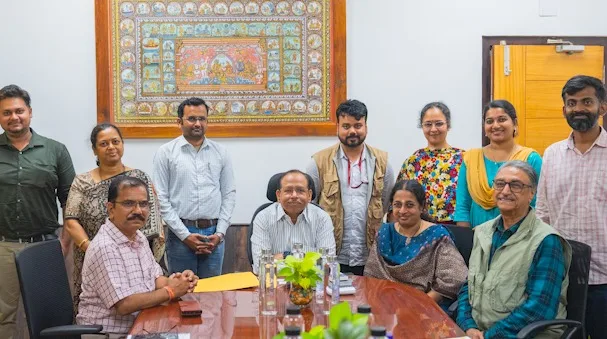By Divya Saini
In a strategic move to mitigate the impact of landslides during storms, the Odisha government in collaboration with Amrita Vishwa Vidyapeetham is gearing up to establish a user-friendly Landslide Early Warning System (EWS) in Gajapati district. This initiative aims to provide advanced information, especially regarding landslides caused by disturbances in the natural stability of a slope.
Representatives from Amrita Vishwa Vidyapeetham engaged in discussions with the Odisha government regarding the system's implementation. Dr. Maneesha V. Ramesh, Dr. Maneesha V. Ramesh, Provost for Strategic Initiatives, Research & Innovation and Director, Amrita Center for Wireless Networks and Applications, along with the Center's geoscience consultant, Dr. Sudesh K. Wadhawan, met with state Chief Administrative Secretary Pradeep Kumar Jena to discuss the implementation of the Landslide Early Warning System. Dr. Sudesh K. Wadhawan emphasized the importance of proactive measures in addressing landslide risks. The discussions, which involved officers from the Odisha State Disaster Management Authority (OSDMA) and other officials, focused on providing the essential knowledge and skills required for the successful execution of the system.
A team of experts from Amrita Vishwa Vidyapeetham, led by Dr Maneesha, also conducted a comprehensive study and surveyed the most vulnerable areas for landslides, including Baraghara and Madha in Rayagada block of the district.
The collaboration between the Govt. of Odisha and Amrita Vishwa Vidyapeetham signifies a joint effort towards disaster preparedness and response. As discussions continue, the partnership aims to bring the Landslide Early Warning System to fruition, setting a benchmark for proactive measures in disaster-prone regions.
The University has successfully deployed the world’s first wireless sensor network system which was later upgraded to the AI integrated Internet of Things (IoT) system for detection and early warning of landslides in Munnar, Kerala. At the request of the Government of India, Amrita has also deployed a similar system in Sikkim, Northeast Himalayas. This applied research, with significant global value for all landslide-prone areas, was directly initiated by the University Chancellor, Mata Amritanandamayi Devi to develop low-cost technologies for wide-area monitoring of landslides, to save human life.
Amrita has received several prestigious recognitions for this work, including the title of World Centre for Excellence (WCoE) on Landslide Risk Reduction by the International Programme on Landslides (IPL) for 3 times in a row. The WCoE has also won the prestigious IPL-KLC Award for Success, which acknowledges commendable projects within IPL, evaluated through an assessment of activities conducted over the past three years at each World Landslide Forum. The university also won the 2023 Averted Disaster Awards for outstanding Disaster Risk Management (DRM) intervention.
In a strategic move to mitigate the impact of landslides during storms, the Odisha government in collaboration with Amrita Vishwa Vidyapeetham is gearing up to establish a user-friendly Landslide Early Warning System (EWS) in Gajapati district. This initiative aims to provide advanced information, especially regarding landslides caused by disturbances in the natural stability of a slope.
Representatives from Amrita Vishwa Vidyapeetham engaged in discussions with the Odisha government regarding the system's implementation. Dr. Maneesha V. Ramesh, Dr. Maneesha V. Ramesh, Provost for Strategic Initiatives, Research & Innovation and Director, Amrita Center for Wireless Networks and Applications, along with the Center's geoscience consultant, Dr. Sudesh K. Wadhawan, met with state Chief Administrative Secretary Pradeep Kumar Jena to discuss the implementation of the Landslide Early Warning System. Dr. Sudesh K. Wadhawan emphasized the importance of proactive measures in addressing landslide risks. The discussions, which involved officers from the Odisha State Disaster Management Authority (OSDMA) and other officials, focused on providing the essential knowledge and skills required for the successful execution of the system.
A team of experts from Amrita Vishwa Vidyapeetham, led by Dr Maneesha, also conducted a comprehensive study and surveyed the most vulnerable areas for landslides, including Baraghara and Madha in Rayagada block of the district.
The collaboration between the Govt. of Odisha and Amrita Vishwa Vidyapeetham signifies a joint effort towards disaster preparedness and response. As discussions continue, the partnership aims to bring the Landslide Early Warning System to fruition, setting a benchmark for proactive measures in disaster-prone regions.
The University has successfully deployed the world’s first wireless sensor network system which was later upgraded to the AI integrated Internet of Things (IoT) system for detection and early warning of landslides in Munnar, Kerala. At the request of the Government of India, Amrita has also deployed a similar system in Sikkim, Northeast Himalayas. This applied research, with significant global value for all landslide-prone areas, was directly initiated by the University Chancellor, Mata Amritanandamayi Devi to develop low-cost technologies for wide-area monitoring of landslides, to save human life.
Amrita has received several prestigious recognitions for this work, including the title of World Centre for Excellence (WCoE) on Landslide Risk Reduction by the International Programme on Landslides (IPL) for 3 times in a row. The WCoE has also won the prestigious IPL-KLC Award for Success, which acknowledges commendable projects within IPL, evaluated through an assessment of activities conducted over the past three years at each World Landslide Forum. The university also won the 2023 Averted Disaster Awards for outstanding Disaster Risk Management (DRM) intervention.


Comments